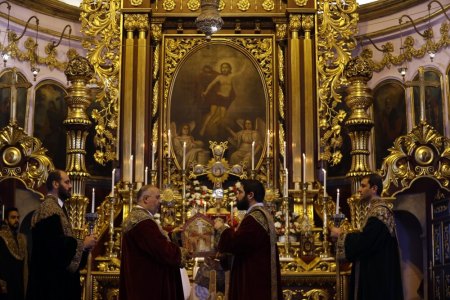Turkish Gov't Seizes 50 Church Properties Amid Property Dispute

The Assyrian Confederation of Europe has condemned the recent government confiscation of dozens of properties from one of the world's oldest Christian communities in Turkey, calling it a "grave violation of human and cultural rights."
The Turkish-Armenian daily Agos recently reported that amid legal and municipal battles over numerous properties, a provincial government has seized about 50 properties belonging to the Syriac Orthodox Church. Church leaders told the news outlet that the government claimed that the deeds to the properties were no longer valid.
"Invaluable and historic churches monasteries and cemeteries — many of which are over a thousand years old, and which constitute some of the most profoundly rooted and culturally significant material pillars of the Assyrian identity itself — are now in jeopardy," reads a statement from the Assyrian Confederation of Europe, which was created by the European Parliament last year to unite the voices of hundreds of thousands of Assyrians across Europe.
The confederation added in the statement shared with The Christian Post that the confiscation of church properties contradicts the image that the national government, run by Recep Tayyip Erdogan, is trying to portray of being tolerant toward religious minorities.
"This recent development sends a negative signal to Assyrians in turkey as well as Assyrians in diaspora who have undertaken (at considerable risk) to not only preserve, but repopulate and rebuild, the ancient Assyrian presence in Turkey," the confederation stated, calling for the government to reverse the confiscations and "guarantee that Assyrian ecclesiastical property is excluded from municipal reform which has facilitated the confiscations."
Al-Monitor reports that an appeal of confiscation of fifth-century Mor Gabriel monastery, which is one of the oldest operating monasteries on Earth, was rejected by a government body created by the Mardin governorate to liquidate assets with deeds that are no longer valid.
"Our churches and monasteries are what root Syriacs in these lands; our existence relies on them. They are our history and what sustains our culture," Mor Gabriel Monastery Foundation Chairman Kuryakos Ergun told Al Monitor. "While the country should be protecting this heritage, we instead see our culture is at risk."
According to Agos, the confiscation efforts are grounded in the fact that many of these church properties were formerly listed in the national land registry as being owned by the villages where they were located.
Erol Dora, a Syriac and a member of the Turkish Parliament, told Al-Monitor that after those villages became incorporated as neighborhoods in the city of Mardin in 2012, the ownership of the properties dissolved. Many of the properties were transferred to the Diyanet, the Turkish government's religious affairs agency.
"We have also filed appeals to the Commission numerous times and taken witnesses. However, they told us that legally it was not possible to give it to us and that its transfer procedures to the Treasury had been completed," Ergun told Agos. "On the other hand the Treasury gave the church monastery and the cemetery to the use of Diyanet. Here we are talking about around 50 churches and monasteries. We are still working on identifying the properties transferred. We will file an application to the directorate General of Foundations and will also file a court case. So far we have filed court cases for around 20 title deeds and we will do the same for around 30 more."
Dora added that those properties should have been turned over to Mor Gabriel and has asked Prime Minister Binali Yildirim to seek a political solution to the problem.
"Turkey must adopt policies that protect citizens of different faiths. This has to be part of efforts to comply with modern democratic principles and rule of law," Dora asserted.
The Assyrian Confederation of Europe has also asked for a political solution to the problem.
"The Assyrian Confederation of Europe intends to follow this issue closely and work to help highlight and resolve the problem," the organization's statement reads.





















